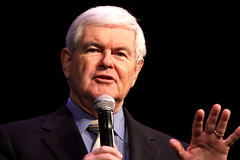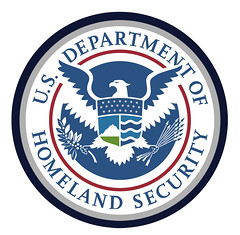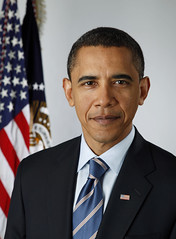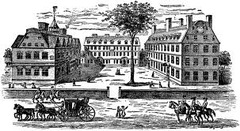AMSCO AP US History Chapter 7 Flashcards
AMSCO United States History 2015 Edition, Chapter 7 The Age of Jefferson, 1800-1816
| 9795826717 | Thomas Jefferson | He was George Washington's first secretary of state. A Democrat-Republican, he was the nation's third president from 1801 to 1809. He stressed the basic principles of constitutional government and limited central government. He appeased the Federalists by maintaining the national bank and debt repayment plan of Hamilton, and carried on the neutrality policies of Washington and Adams. He reduced the size of the military, eliminated some federal jobs, repealed excise taxes, and lowered the national debt. In 1803, he made the Louisiana Purchase from France. (p. 131) |  | 0 |
| 9795826718 | Louisiana Purchase | In 1803, President Thomas Jefferson purchased the Louisiana territory from France for $15 million. The purchase more that doubled the size of the United States, removed a European presence from the nation's borders, and extended the western frontier well beyond the Mississippi River. (p. 133) |  | 1 |
| 9795826719 | war hawks | The 1810 congressional election brought a group of young Democratic-Republicans to Congress. Led by Henry Clay and John C. Calhoun they gained influence in the House of Representatives. They argued that war with Britain was the only way to defend American honor, gain Canada, and destroy American Indian resistance on the frontier. (p. 139) |  | 2 |
| 9795826720 | Henry Clay | In 1810, he was a Kentucky member of the House of Representatives. He was a war hawk who argued for war with Britain. (p. 139) |  | 3 |
| 9795826721 | John C. Calhoun | In 1810, he was a South Carolina member of the House of Representatives. He was a war hawk who argued for war with Britain. (p. 139) |  | 4 |
| 9795826722 | Tecumseh | This Shawnee warrior, who along with his brother, attempted to unite all American Indian tribes east of the Mississippi River. (p. 138) |  | 5 |
| 9795826755 | Prophet | This Shawnee religious leader, who along with his brother, attempted to unite all American Indian tribes east of the Mississippi River. (p. 138) |  | 6 |
| 9795826723 | William Henry Harrison | In 1811, this governor of the Indiana Territory, destroyed Shanee headquarters and put an end to Tecumseh's efforts to form an American Indian confederacy. (p. 138) |  | 7 |
| 9795826724 | Battle of Tippecanoe | An 1811 battle, where U.S. troops led by William Henry Harrison did battle against American Indians led by Tecumseh. (p. 138) |  | 8 |
| 9795826725 | strict interpretation of Constitution | President Thomas Jefferson was committed to a strict interpretation of the Constitution and rejected Alexander Hamilton's argument that certain powers were implied. When Jefferson made the Louisiana Purchase he was troubled because the Constitution did not state explicitly that a president could purchase foreign land. He finally argued that the president's powers to make treaties allowed for the purchase. (p. 133) |  | 9 |
| 9795826726 | John Marshall | This Federalist Chief Justice of the Supreme Court served in the position for 34 years. His decisions in landmark cases generally strengthened the federal government, often at the expense of states rights. (p. 134) |  | 10 |
| 9795826727 | judicial review | In 1803, Marbury v. Madison case, the Marshall court established the doctrine of judicial review by ruling that a law passed by Congress was unconstitutional. From this point on, the Supreme Court could overrule the legislative or executive branches if they believed a law was unconstituional. (p. 134) |  | 11 |
| 9795826756 | Marbury v. Madison | A Supreme Court case in 1803 where Chief Justice John Marshall ruled that a law passed by Congress was unconstitutional. This established the doctrine of judicial review, where the Supreme Court could overrule actions taken by the legislative and executive branches of the government. (p. 134) |  | 12 |
| 9795826728 | Aaron Burr | He was Thomas Jefferson's vice president from 1801 to 1804. A new vice president was chosen for Jefferson's second term. He then organised a failed conspiracy, attempting to unite New England states and secede from the United States. He killed Alexander Hamilton in a duel. In 1806 was tried for treason because of a plan to capture Mexico and possibly unite it with Louisiana. He was acquitted of the charge. (p. 135) |  | 13 |
| 9795826729 | Quids | In 1812, they were "Old" Democratic-Republicans who criticized the War of 1812 because it violated the classic Democratic-Republican commitment to limited federal power and the maintenance of peace. (p. 140) |  | 14 |
| 9795826730 | Hartford Convention (1814) | In December 1814, a special convention was held in Hartford, Connecticut. Bitterly opposed to the the War of 1812, some radical Federalist in the Northeast wanted to secede from the United States, but it was rejected. However, to limit the power of the Democratic-Republicans they adopted a proposal that a two-thirds vote of both houses would be required for any future declaration of war. (p. 141) |  | 15 |
| 9795826731 | Napoleon Bonaparte | In the War of 1812 the United States based their hope for victory on Napoleon successfully fighting the British in Europe. However, in the spring of 1814, Napoleon's losses enabled the British to increase their forces in North America. (p. 141) |  | 16 |
| 9795826732 | Toussaint I'Ouverture | He led a rebellion against French rule on the island of Santo Domingo which resulted in heavy French losses. (p. 132) |  | 17 |
| 9795826733 | Barbary pirates | The United States had been paying the Barbary states on the North African coast in exchange for safe passage of U.S. ships in the Mediterranean. President Jefferson stopped paying the tribute, and the U.S. fought the Barbary Wars from 1801 to 1805. There was no decisive victory but it did offer some protection to U.S. ships in the region. (p. 136) |  | 18 |
| 9795826734 | neutrality | Around 1804, the Napoleonic wars dominated Europe. Britain was seizing U.S. ships, confiscating the cargo and forcing sailors to join the British navy. This made it difficult for President Jefferson to maintain a position of not taking sides in the conflict. (p. 136) |  | 19 |
| 9795826735 | impressment | The British practice of taking American sailors from American ships and forcing them to serve in the British navy. (p. 136) |  | 20 |
| 9795826736 | Chesapeake-Leopard affair | In 1807, the British warship Leopard attacked the American warship Chesapeake. Three U.S. sailors were killed and four were taken captive. Many Americans demanded war but Jefferson used diplomacy and economic pressure in response. (p. 136) |  | 21 |
| 9795826737 | Embargo Act (1807) | In 1807, this act prohibited American trading ships from sailing to any foreign port. It was meant to force Britain and France to change their policies towards neutral vessels, by depriving them of American trade. The embargo backfired and brought greater economic hardship to the United States than Britain. In 1809 it was repealed. (p 136) |  | 22 |
| 9795826738 | James Madison | The fourth President of the United States from 1809 to 1817. A Democrat-Republican and a close friend of Thomas Jefferson. A member of the Continental Congress and the Constitutional Convention, he strongly supported ratification of the Constitution. He was a contributor to The Federalist Papers. His presidency was marked by the War of 1812. (p. 137) |  | 23 |
| 9795826739 | Nonintercourse Act (1809) | In 1809, this act provided that America could now trade with all nations except Britain and France. (p. 137) |  | 24 |
| 9795826740 | Macon's Bill No. 2 (1810) | When economic hardships continued into 1810, Nathaniel Macon, a member of Congress, introduced a bill that restored U.S. trade with both Britain & France. It also provided that if either France or Britain formally agreed to respect neutral rights at sea, then the U.S. would prohibit trade with the foe of that nation. (p. 138) |  | 25 |
| 9795826741 | War of 1812 | A war between the United States and Great Britain caused by American outrage over the impressment of American sailors by the British and British aid to the Indians attacking the Americans on the western frontier. The War Hawks (young westerners led by Henry Clay and John C. Calhoun) argued for war in Congress. American troops attempted an invasion of Canada, but it was repulsed by British defenders. Numerous naval battles occurred and at one point the British marched through Washington, D.C. and burned the White House. In December 1814 the Treaty of Ghent was reached and territory was returned to the pre-war status. Two weeks later, Andrew Jackson's troops defeated the British at the Battle of New Orleans, not knowing that a peace treaty had already been signed. (p. 138) |  | 26 |
| 9795826742 | Old Ironsides | The nickname for the U.S. warship, Constitution. In 1812, it raised American morale by sinking a British ship off the coast of Nova Scotia. (p. 140) |  | 27 |
| 9795826743 | Battle of Lake Erie | Probably the most important U.S. naval victory in the War of 1812. Captain Oliver Hazard Perry led the U.S. to victory against the British. (p. 140) |  | 28 |
| 9795826744 | Oliver Hazard Perry | This naval captain won the Battle of Lake Erie in the War of 1812. His famous quote was, "We have met the enemy, and they are ours." (p. 140) |  | 29 |
| 9795826745 | Battle of the Thames River | This naval battle, near Detroit, was led by General William Henry Harrison. The U.S. defeated the British, and the American Indian Tecumseh was killed. (p. 140) |  | 30 |
| 9795826746 | Thomas Macdonough | In 1814, this U.S. naval commander defeated a British fleet on Lake Champlain. As a result the British had to retreat and abandon their plan to invade New York and New England. (p. 140) |  | 31 |
| 9795826747 | Battle of Lake Champlain | A battle where the British fleet was defeated and was forced to retreat and to abandon their plans to invade New York and New England. (p. 140) |  | 32 |
| 9795826748 | Andrew Jackson | In the War of 1812 this U.S. general defeated the Creek nation at the Battle of Horseshoe Bend. The British were trying to control the Mississippi River and he defeated them at the Battle of New Orleans. He would later become the seventh president of the United States. (p. 141) |  | 33 |
| 9795826749 | Battle of Horseshoe Bend | In March 1814, General Andrew Jackson defeated the Creek nation, an important British ally. The battle was fought in present-day Alabama and ended American Indian resistance in that area. (p. 141) |  | 34 |
| 9795826750 | Creek Nation | This American Indian tribe was an important British ally in the War of 1812 until being defeated by Andrew Jackson. (p. 141) |  | 35 |
| 9795826751 | Battle of New Orleans | On January 8, 1815, General Andrew Jackson led U.S. troops that defeated the British at New Orleans. At that time communications were much slower and the armies did not know that the Treaty of Ghent had ended the war two weeks earlier. (p. 141) |  | 36 |
| 9795826752 | Treaty of Ghent (1814) | The peace treaty that ended the War of 1812. The terms halted fighting, returned all conquered territory to the prewar claimant, and recognized the pre war boundary between Canada and the United States. (p. 141) |  | 37 |
| 9795826753 | Lewis and Clark Expedition | In 1804, Captain Meriwether Lewis and Lieutenant William Clark left St. Louis, Missouri on an expedition to the Pacific coast. They travelled up the Missouri River to the Great Divide, and then down the Columbia River to the Pacific Ocean. the expedition provided greater scientific knowledge of the region, stronger claims to the Oregon Territory, better relationships with the American Indians, and more accurate maps. (p. 134) |  | 38 |
| 9795826754 | Francis Scott Key | He wrote our national anthem while observing the British attack on Fort McHenry in Baltimore. (p. 141) |  | 39 |
| 9795826757 | The Star Spangled Banner | The United States national anthem composed by Francis Scott Key in 1814. (p. 141) |  | 40 |































































































































































